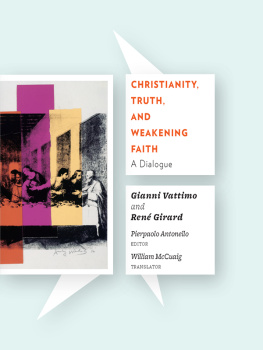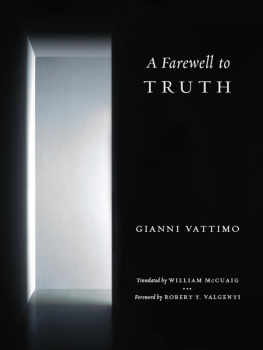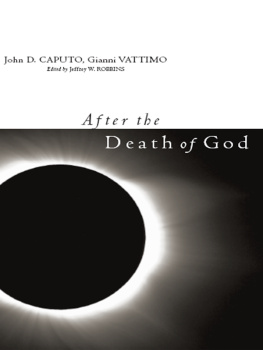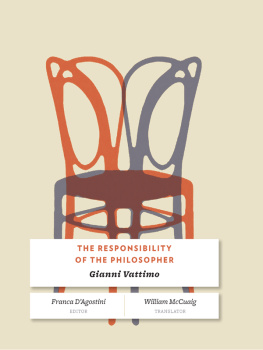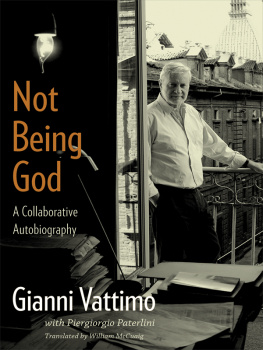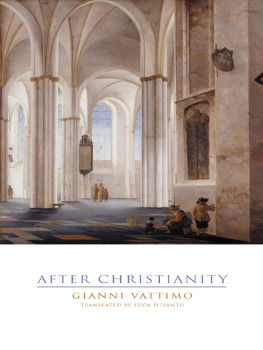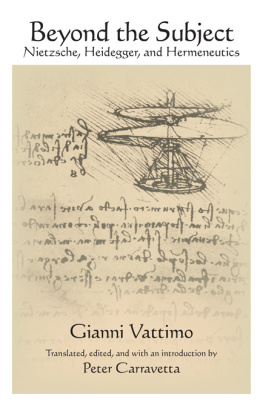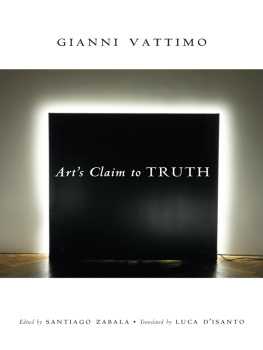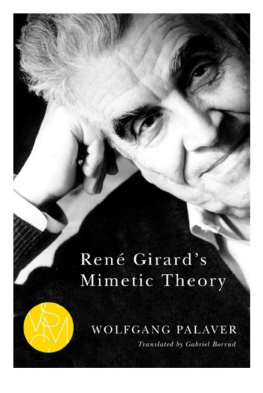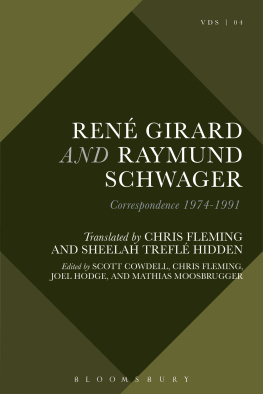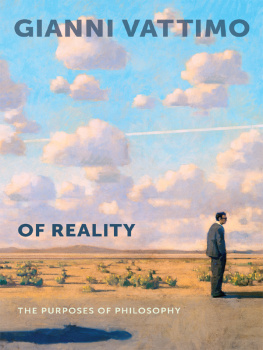CHRISTIANITY, TRUTH, AND WEAKENING FAITH
GIANNI VATTIMO and REN GIRARD
CHRISTIANITY, TRUTH, AND
WEAKENING FAITH
A Dialogue
Edited byPIERPAOLO ANTONELLO
Translated byWILLIAM MCCUAIG
COLUMBIA UNIVERSITY PRESS NEW YORK
COLUMBIA UNIVERSITY PRESS
Publishers Since 1893
New York Chichester, West Sussex
cup.columbia.edu
Originally published as Verit o Fede Debole, copyright 2006 Pier Vittorio e Associati, Transeuropa, Massa
English translation copyright 2010 Columbia University Press
English-language edition published by arrangement with Eulama Literary Agency, Rome
All rights reserved
E-ISBN 978-0-231-52041-6
Library of Congress Cataloging-in-Publication Data
Vattimo, Gianni, 1936
[Verita o fede debole. English]
Christianity, truth, and weakening faith: a dialogue / Gianni Vattimo and Ren Girard; edited by Pierpaolo Antonello; translated by William
McCuaig.
p. cm.
Includes bibliographical references.
ISBN 978-0-231-14828-3 (cloth : alk. paper)ISBN 978-0-231-52041-6
(e-book)
1. ChristianityPhilosophy. 2. Christianity and culture.
3. Relativity. I. Girard, Ren. II. Antonello, Pierpaolo. III. Title.
BR100.V3513 2010
261.2 1dc22 2009025569
A Columbia University Press E-book.
CUP would be pleased to hear about your reading experience with this e-book at .
References to Internet Web sites (URLs) were accurate at the time of writing. Neither the author nor Columbia University Press is responsible for URLs that may have expired or changed since the manuscript was prepared.
CONTENTS
The provenance of the chapters of this book is as follows:
Revised and expanded from the introduction to the Italian edition, Verit o Fede Debole?
, Gianni Vattimo and Ren Girard, Christianity and Modernity. A debate between Girard and Vattimo held in the city of Pordenone on 25 September 2004, as part of the Pordenonelegge festival.
, Gianni Vattimo and Ren Girard, Faith and Relativism. The final round-table debate of the conference Identit e desiderio, on the work of Ren Girard in relation to the social sciences and literary theory. Falconara, Sala consigliare, 10 March 2006.
in this book.
, Gianni Vattimo, Heidegger and Girard: Knosis and the End of Metaphysics. First published in German in B. Dieckmann, Das Opferaktuelle Kontroversen. Religions-politischer Diskurs im Kontext der mimetischen Theorie. Mnster: Lit Verlag, 1999. Vattimo originally drafted this text in English as a conference paper, and that text has been revised for this book by the translator.
, Ren Girard, Not Just Interpretations, There Are Facts Too. Girard originally drafted this essay in English, and that text has been revised for this book by the translator.
Among the numerous conflicts that characterize contemporary philosophical and intellectual discourse, the one between laicism and religionbetween the need for democratic states to promote confessional pluralism and substantial relativism, and the supposedly peremptory, authoritarian, and hegemonic culture of the religionsis emerging as one of the most crucial and important. The debate on the laicity of the state in France or in Turkey, the theologization of politics in the United States, the discussion of so-called postsecular society in Germany, the ongoing debate in Italy about the relation between relativism and faith, and the polemical fury over the clash of science and religion sparked by Richard Dawkinss The God Delusion in Great Britain are all telling examples of a discussion that is growing ever more heated, and not just in the Western context. The problem is that, very often, these debates become polarized in a way that does more to encourage the spirit of disputation and journalistic simplification than it does to promote a precise and cogent articulation of the terms of the question: vociferous protagonists on both sides tend to emphasize, and not always in good faith, the difference between value systems and their proponents, whether laic and materialist on one hand (allegedly heirs of the Enlightenment or, rather, of an ingenuous scientism), or Christian and fideistic on the other. Their extremist tone has the paradoxical effect of reminding us that extremes tend to converge, and to sound alike.
There are other, less clamorous theoretical stances, though, that do not set up stockades or barriers on the field of battle but instead propose a theoretical and philosophical terrain that allows an effective reconciliation between religion and laicity, between the need to promote relativism within liberal society and acceptance of the importance of religions in peoples private and public lives and in creating shared ethical foundations. This book is a contribution to this discussion from a perspective of this kind: it offers two voices in the contemporary intellectual debate that are engaged not in separating the two camps but in uniting them, on the basis of an intuition already partially elaborated by Max Weber, implicitly suggested and described by Eric Auerbach in Mimesis, and more recently argued by Marcel Gauchet, to the effect that secularizationand hence laicismis, in substance, produced by Christianity. In other words, Christianity is the religion of the exit from religion,
CHRONICLE OF A DIALOGUE
As a matter of fact, the purpose of this book is twofold. As mentioned, the aim is first of all to supply the reader with some food for thought about problems that are at the center of recent theoretical and critical discussion, especially the relation between religion and modernity and the role of Christianity in a globalized and multicultural world, but also the complex and delicate interface between truth and liberty, and relativism and faith, and the dangers and tensions of a world in which new forms of religiously inspired violence have emerged. In addition, this volume aims to put on public record a philosophical rapprochement that has come about between two of the major contemporary European thinkersthe French anthropologist Ren Girard and the Italian philosopher Gianni Vattimoin a series of dialogues that have taken place on various public and academic occasions and that are gathered here for the first time. Precisely because the aim is to create a record of an encounter and an open and friendly debate, free of polemical acrimony and imprinted with strong mutual respect, I have chosen to begin with three public debates between Girard and Vattimo and conclude with the more strictly philosophical articulation of their discussions, in the form of two essays in which they comment on each others ideas, underlining the points of both convergence and dissent.
In this sense, more than a systematic treatise in philosophy or theology, this book could be defined as the diary of a meeting of minds prompted by the common willingness of the participants to engage in discussion and by a convergence of interests and philosophical questions. As regards the genesis and articulation of this dialogue, it should be emphasized that Vattimo was the first to engage all the ramifications of the themes treated here, primarily in books like The End of Modernity (1985), The Transparent Society (1989), After Christianity (2002), and Nihilism and Emancipation (2003).
In this light, Vattimo deserves recognition for not letting prejudice prevent him from drawing close to an untimely and not especially politically correct author like Girard and for having begun to talk about the role and the importance of religion from within his own philosophical perspective well before recent headline-making events dramatically illustrated the urgency of rethinking the religious in contemporary terms. Evidence of this can be found in the third of the debates appearing in this book, which dates from 1996, and the two final essays, which both date from 1999. Yet Vattimo remained faithful to his own deconstructive, hermeneutic, and relativistc stance, even in the wake of 9/11, when a whole swarm of intellectuals of various provenance were busy singing the

